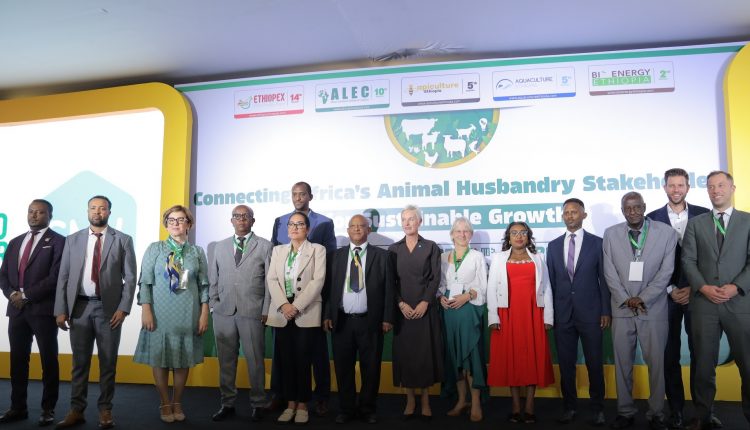Bounty of the Basket targets increased livestock productivity & sustainable food systems in Ethiopia
Addis Ababa, October 30, 2025 (FMC) — Ethiopia is accelerating the transformation of its livestock sector through the Bounty of the Basket (YeLemat Trufat) program, a national initiative designed to increase livestock productivity, improve nutrition, and build resilient, self-sustaining agricultural systems, the country’s Agriculture Ministry said today.
The flagship program was highlighted during the opening of the country’s first international animal husbandry exhibition and congress today, signaling the government’s commitment to modernizing the sector and ensuring food security.
The three-day event, hosted at Millennium Hall, brings together over 100 participants from 14 countries, including national pavilions from the Netherlands and Brazil, and is expected to attract more than 5,000 visitors from Ethiopia, East Africa, and beyond.
In his opening remarks, Alemayehu Mekonnen, Senior Advisor to the State Minister of Agriculture for Fisheries and Livestock, emphasized that the exhibition showcases Ethiopia’s efforts to overcome long-standing challenges in the livestock sector, including limited technology adoption, trade connectivity gaps, and insufficient innovation.
“The performance of the sector remains far below its potential in generating income and ensuring food security,” Alemayehu said. “Programs such as Bounty of the Basket and the Ethiopian Food Systems Transformation and Nutrition (EFSTN) strategy are designed to address these gaps and ensure resilient, inclusive, and sustainable food systems.”
He highlighted that the Bounty of the Basket program, introduced by Prime Minister Abiy Ahmed, targets growth across multiple agricultural sectors, including livestock, poultry, fisheries, aquaculture, apiculture, irrigation farming, mechanization, and agro-processing. It also focuses on climate-smart practices, rural income generation, post-harvest handling, and market linkages, aiming to create a self-sustaining and productive agricultural system.
Despite progress in recent years, Alemayehu noted that climate variability, limited technology adoption, and insufficient stakeholder collaboration continue to challenge sector growth, particularly in pastoral and agropastoral areas.
He encouraged participants to leverage the exhibition as a platform for innovation, investment, and partnership building to meet Africa’s rising demand for animal products.
For her part, Christine Pirenne, Ambassador of the Netherlands to Ethiopia, said livestock is central to Ethiopia’s economic growth, job creation, and long-term food security.
She highlighted the continued engagement of Dutch companies and the Ethiopian Agricultural Transformation Institute (ATI) in driving technological advancement and knowledge transfer. “With the right investment and systems, Ethiopia’s livestock potential can be even greater,” she said.
Ms. Angela Pimenta Peres, Director of Trade Promotion at the Brazilian Ministry of Agriculture, highlighted opportunities for partnerships between Ethiopia and Brazil, particularly in technology transfer, capacity building, and investment to advance Africa’s livestock sector.
Ms. Julie Graham, Country Director for SNV Ethiopia, described the exhibition as a catalyst for trade, investment, and innovation, emphasizing the role of the Bounty of the Basket program in leveraging Ethiopia’s livestock potential while promoting climate-resilient and commercially viable practices.
The three-day event features the 14th Ethio Poultry Expo (ETHIOPEX), the 10th African Animal Husbandry Exhibition and Congress (ALEC), the 5th Apiculture and Aquaculture Ethiopia International Trade Show, and the 2nd Bioenergy Trade Show, providing a comprehensive platform for knowledge exchange, business matchmaking, and investment opportunities.
Organized by Prana Events in collaboration with Sudan-based Expo Team, the exhibition aims to modernize Ethiopia’s livestock, poultry, honey, and aquaculture sectors, while fostering regional trade and international partnerships. Over 5,000 visitors from Ethiopia, East Africa, and the international community are expected to participate.

